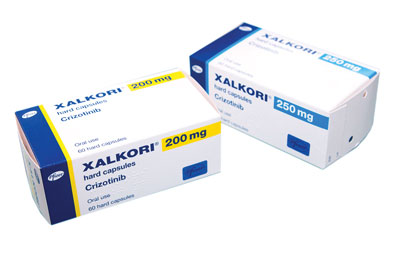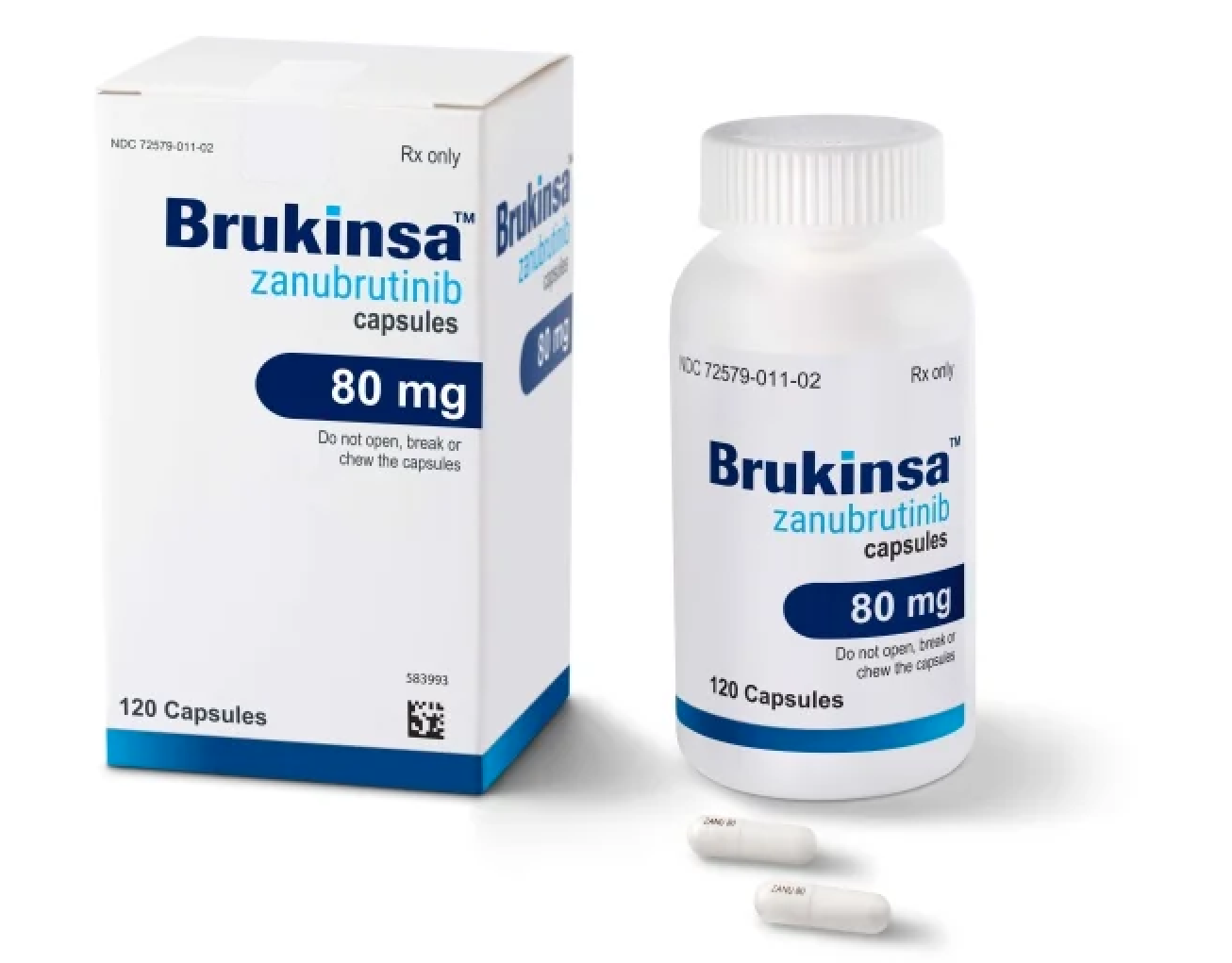Xalkori (crizotinib) vs Brukinsa (zanubrutinib)
Xalkori (crizotinib) vs Brukinsa (zanubrutinib)
Xalkori (crizotinib) is an anaplastic lymphoma kinase (ALK) inhibitor used primarily for the treatment of non-small cell lung cancer (NSCLC) with specific genetic alterations, such as ALK or ROS1 mutations. Brukinsa (zanubrutinib) is a Bruton's tyrosine kinase (BTK) inhibitor indicated for the treatment of mantle cell lymphoma (MCL) and other B-cell malignancies, not typically used for lung cancer. When deciding between these medications, it is crucial to consider the specific type of cancer and its genetic profile, as each medication targets different pathways and is approved for different indications.
Difference between Xalkori and Brukinsa
| Metric | Xalkori (crizotinib) | Brukinsa (zanubrutinib) |
|---|---|---|
| Generic name | Crizotinib | Zanubrutinib |
| Indications | Non-small cell lung cancer (NSCLC), ALK or ROS1-positive metastatic NSCLC | Mantle cell lymphoma (MCL), Waldenström's macroglobulinemia, marginal zone lymphoma |
| Mechanism of action | ALK and ROS1 tyrosine kinase inhibitor | Bruton's tyrosine kinase (BTK) inhibitor |
| Brand names | Xalkori | Brukinsa |
| Administrative route | Oral | Oral |
| Side effects | Visual disorders, GI disturbances, edema, elevated liver enzymes, fatigue, decreased appetite | Neutropenia, thrombocytopenia, anemia, diarrhea, bruising |
| Contraindications | Hepatic impairment, concurrent use with strong CYP3A inhibitors/inducers | Hemorrhage, infections, cytopenias |
| Drug class | Tyrosine kinase inhibitor | BTK inhibitor |
| Manufacturer | Pfizer | BeiGene |
Efficacy
Xalkori (Crizotinib) Efficacy in Lymphoma
Xalkori (crizotinib) is primarily known as a treatment for non-small cell lung cancer (NSCLC) that harbors specific genetic alterations, such as ALK or ROS1 rearrangements. However, its efficacy in lymphoma, particularly anaplastic large cell lymphoma (ALCL) that expresses the ALK gene mutation, has been a subject of clinical interest. In cases of ALK-positive ALCL, crizotinib has demonstrated potential efficacy due to its ability to inhibit the ALK tyrosine kinase that drives the growth of these cancer cells. Clinical trials have shown that crizotinib can induce responses in patients with relapsed or refractory ALK-positive ALCL, suggesting a role for this drug in the management of this subtype of lymphoma.
Despite these promising results, it is important to note that the use of crizotinib in lymphoma is considered off-label, and more extensive clinical trials are needed to fully establish its efficacy and safety profile for this indication. Therefore, while some patients with ALK-positive ALCL may benefit from crizotinib therapy, it is not currently a standard treatment for lymphoma, and its use should be considered within the context of clinical trials or as part of a comprehensive treatment plan discussed with a healthcare professional.
Brukinsa (Zanubrutinib) Efficacy in Lymphoma
Brukinsa (zanubrutinib) is a Bruton's tyrosine kinase (BTK) inhibitor that has shown efficacy in the treatment of various B-cell malignancies, including lymphoma. Zanubrutinib has been specifically approved for the treatment of mantle cell lymphoma (MCL) in patients who have received at least one prior therapy. Clinical trials have demonstrated that zanubrutinib can achieve high response rates in patients with relapsed or refractory MCL, with a significant proportion of patients achieving complete remission. The drug's efficacy in this setting provides a valuable therapeutic option for patients with this aggressive form of lymphoma.
In addition to MCL, zanubrutinib is being investigated for its potential use in other types of lymphoma, such as Waldenström's macroglobulinemia and marginal zone lymphoma. Early clinical studies have shown encouraging results, with zanubrutinib demonstrating a favorable safety profile and effective disease control in these patient populations. However, as with any medication, the decision to use zanubrutinib should be made in consultation with a healthcare provider, taking into account the specifics of the patient's condition and the most current clinical evidence.
Regulatory Agency Approvals
Xalkori
-
European Medical Agency (EMA), European Union

-
Food and Drug Administration (FDA), USA

-
Health Canada

-
Pharmaceuticals and Medical Devices Agency (PMDA), Japan

-
Therapeutic Goods Administration (TGA), Australia

Brukinsa
-
European Medical Agency (EMA), European Union

-
Food and Drug Administration (FDA), USA

Access Xalkori or Brukinsa today
If Xalkori or Brukinsa are not approved or available in your country (e.g. due to supply issues), you can access them via Everyone.org.
How it works

Make an enquiry
Choose the medicine you want to buy, answer a couple of questions, and upload your prescription to speed things up. We’ll get back to you within 24 hours.


Make an enquiry
Choose the medicine you want to buy, answer a couple of questions, and upload your prescription to speed things up. We’ll get back to you within 24 hours.


Breeze through the paperwork
We'll guide you through the required documents for importing unapproved medicine, ensuring you have all the necessary information.


Get a personalized quote
We’ll prepare a quote for you, including medicine costs and any shipping, administrative, or import fees that may apply.


Receive your medicine
Accept the quote and we’ll handle the rest - sourcing and safely delivering your medicine.

Some text on this page has been automatically generated. Speak to your physician before you start a new treatment or medication.
Let's talk
If you have any questions, call us or send us a message through WhatsApp or email:
Contact us




